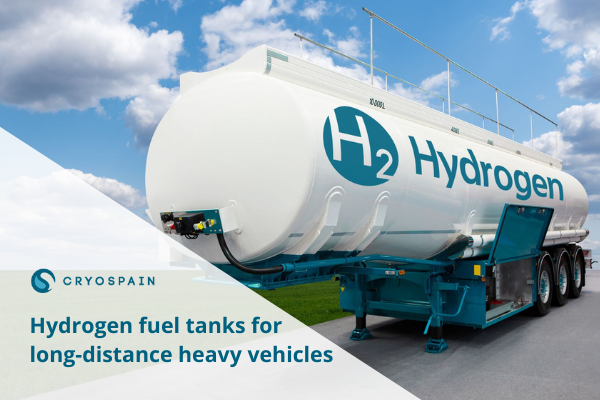The possibility of developing efficient hydrogen fuel tanks lies at the heart of facilitating greener, more sustainable long-distance heavy transportation.
However, in order to advance in this direction, companies must have access to cost-efficient and safe liquid hydrogen storage tank models.
We take a look at current hydrogen transportation possibilities and what an hydrogen fuel tank needs to offer to move forward in this direction.
What are exactly hydrogen fuel tanks?
A hydrogen fuel tank is a type of storage technology for hydrogen.
As hydrogen can be stored both in its liquid and gaseous state, this solution can take the form of a liquid hydrogen storage tank (requiring cryogenic temperatures) or a high-pressure tank, for its gaseous state.
In order to be able to use hydrogen in transportation and other processes (such as portable or stationary power), the right hydrogen storage tank must be found.
What are hydrogen-powered vehicles?
The hydrogen fuel tank has taken center stage as different industries increasingly rely on this element. It’s the case of the transportation sector, which is investing in developing efficient hydrogen-powered vehicles.
These vehicles employ hydrogen to create a chemical reaction that releases energy. However, as opposed to traditional, gasoline-powered cars, these cars only release water vapor into the atmosphere, eliminating the damaging CO2 emissions.
Hydrogen-powered vehicles create this energy through hydrogen fuel cells or hydrogen-powered engines. The use of a hydrogen fuel tank lies at the heart of these operations.
You may like: Revolutionizing the aeronautical industry with liquid hydrogen
Are hydrogen-powered trucks better?
The option of using hydrogen-powered trucks has received growing attention in light of a global effort to reduce CO2 emissions. This is particularly true for heavy vehicles, which are considered to be responsible for around a fifth of CO2 emissions from road transport in the EU, and 6% of EU carbon emissions overall.
As such, hydrogen-powered vehicles overcome many of the limitations of both gasoline and electric vehicles, including the following:
- They only emit water vapor, minimizing CO2 emissions
- Hydrogen is a renewable energy source, as opposed to fossil fuels
- Refueling times are short
- Usage time is extended, even when carrying heavy loads
- There’s no acoustic or visual pollution related to them
Challenges working with hydrogen fuel tanks
Hydrogen presents a low energy-per-unit volume because at a low ambient temperature density. This can limit storage options for this element and hydrogen fuel tanks in particular.
On the one hand, hydrogen in gaseous form requires large-volume structures, which is not viable for portable applications such as the need for long-distance heavy vehicles. As such, the industry works to develop storage solutions that allow a driving range that goes beyond 300 miles but also optimize space.

There are two pathways that are being considered to solve this challenge. On the one hand, compressed gas storage of hydrogen will provide a short-term solution that is also adequate in economic terms. In this case, the hydrogen fuel tanks will need to reach a 700 bar pressure.
However, long-term solutions rely on having access to liquid hydrogen storage tank models that allow for increased hydrogen density and thus remain more efficient solutions to meet the 300-mile target stated above for long-distance heavy vehicles.
How Cryospain can help with hydrogen fuel tanks
At Cryospain we offer our expertise in cryogenic engineering for companies looking to evolve in their hydrogen fuel tank solutions.
These storage solutions are ideal for hydrogen production plants who need access to the right systems to store liquid hydrogen.
Through analyzing each project ‘s needs, we’re able to take care of the whole process: from design to implementation, offering turnkey solutions that we also help setting up at the desired location.
Related content: Hydrogen stations for cars and their increasing presence in Europe
At the same time, we’re also capable of designing and manufacturing different pieces of equipment that are related to liquid hydrogen storage, including:
- High-vacuum distribution pipes that conduct liquid hydrogen from its source to the final destination in a safe and efficient manner
- Cryogenic pump skids, including those with HMI technology so that their management and handling is easier for human teams
Additionally, we’re able to offer high-pressure, high-vacuum cryogenic storage solutions at a large scale, which may also become the right solution for companies in search for hydrogen fuel tanks.
Our equipment comes hand in hand with our team’s expertise, who are always looking for state-of-the-art solutions to improve efficiency. In fact, at the present moment they’re also focused on designing loading systems for tanks and hydrogen bottles, in order to facilitate this process and guarantee it remains efficient and safe, pushing hydrogen-powered vehicles a step further.
Thus, we work to represent a reliable partner for companies looking to switch to hydrogen-based models, leaving obsolete fossil fuel models and providing a 360-degree solution for this sort of project.
Want to learn more about Cryospain and how we can help you achieve efficient storage systems for hydrogen-powered vehicles? Get in touch with us and let our technical team know about your needs.











 Contacte-nos
Contacte-nos